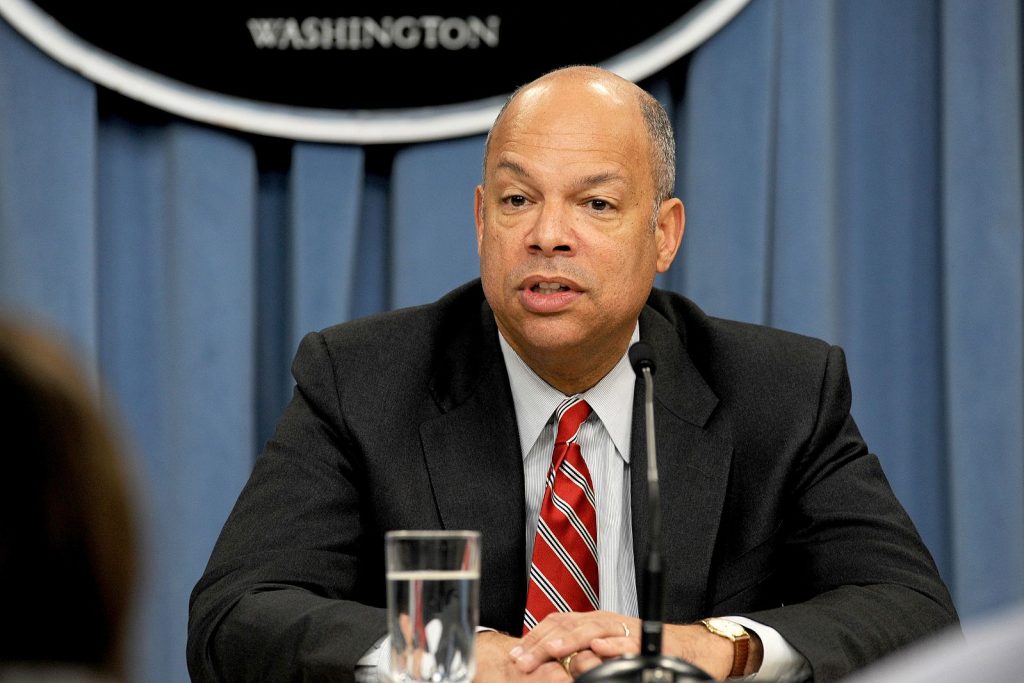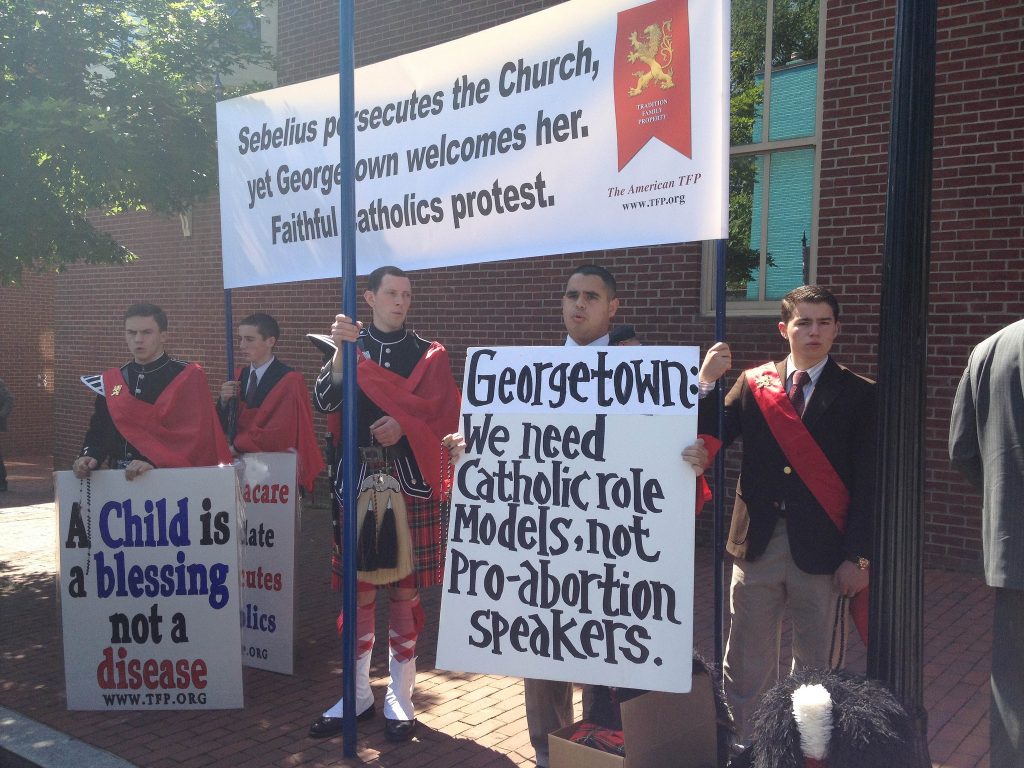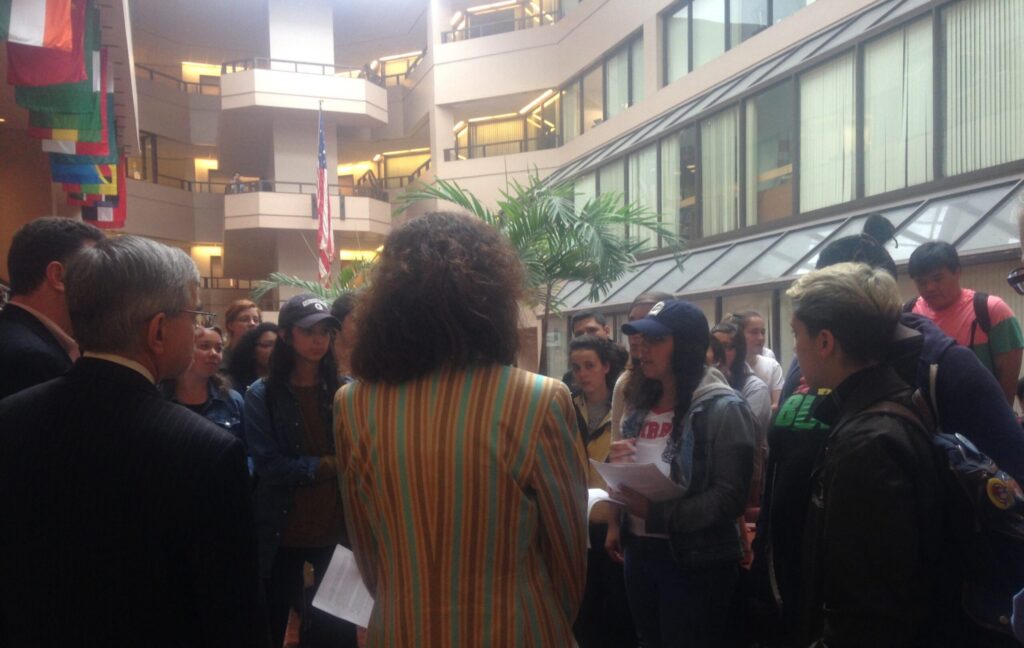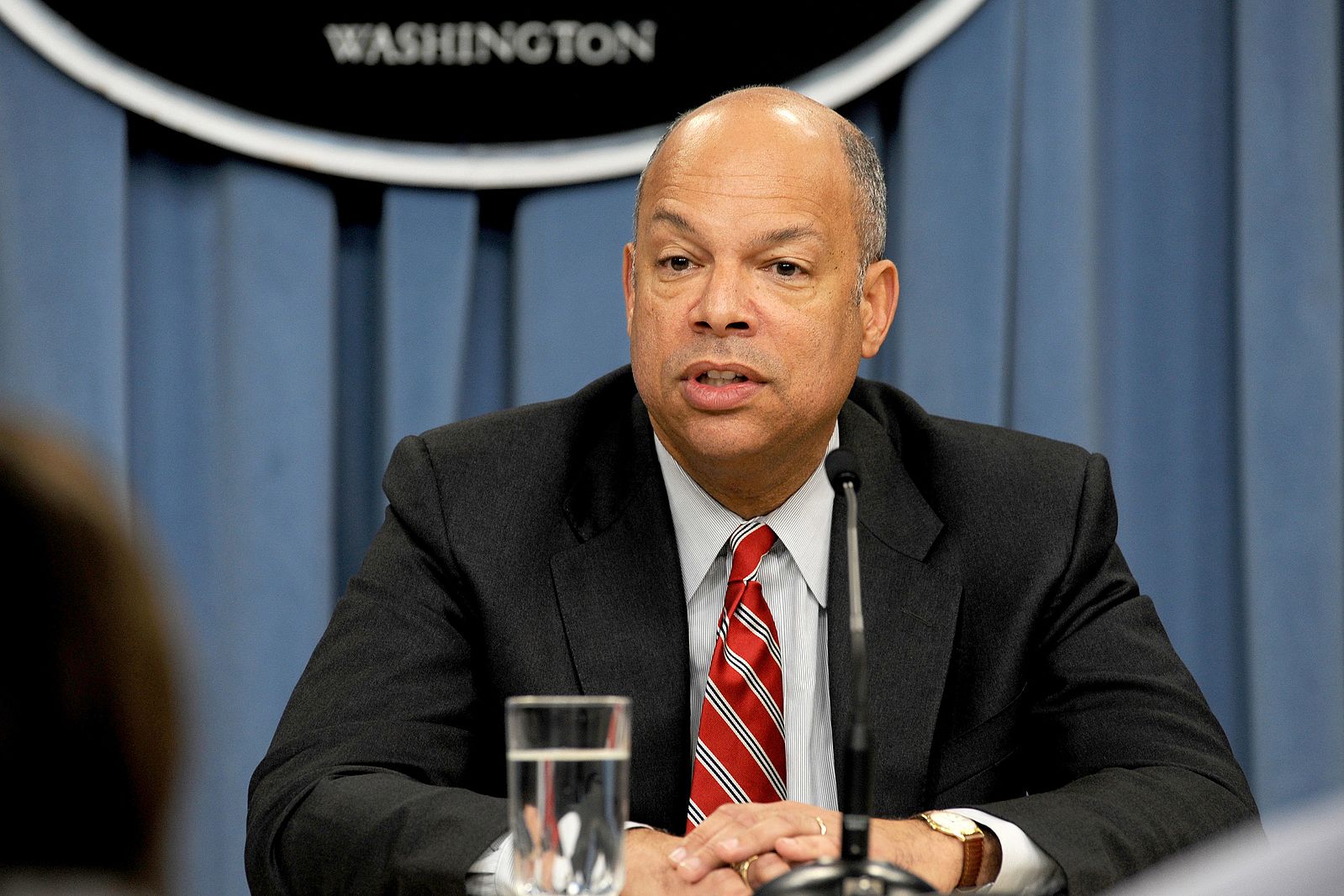Welcome to our first ever Editorial Board Slack Chat. Today we’ll be talking about the University’s decision to invite Jeh Johnson, the Secretary of the Department of Homeland Security (DHS), as the SFS Commencement Speaker. As we have reported, a contingent of Georgetown students have written and submitted a letter calling for his disinvitation. In light of Georgetown’s recent written support of undocumented students, we decided to discuss whether the University should accept this request and find a new commencement speaker.
danielvarghese (Daniel Varghese, Editorial Board Chair): Okay. Let’s do this. I’d like to start by saying that our discussion today is not about whether undocumented students have a right to to be upset about the university’s decision to invite Jeh Johnson to speak at their commencement. It shouldn’t be our place to determine when and why someone can feel a particular emotion, right?
kevin_huggard (Kevin Huggard, Editor-in-Chief): Yes, I think we’re all in agreement there. It shouldn’t be anyone’s place to tell others when they can and cannot be upset by something. The question is whether some being upset is enough to justify disinviting Johnson as a speaker.

Photo: R. D. Ward/US Department of Defense
lizteitz (Liz Teitz, Former News Editor): I think that has a lot to do with what we think the role of a commencement speaker is, and what the university is looking for in one. I had a phone interview with Dean Hellman earlier today, and what he said was that they look for someone who’s dedicated themselves to public service, and who is engaging with and looking for solutions to complex, critical national and global issues. And I think that at least it’s safe to say that Johnson’s work with the DHS certainly meets that second criteria.
He also said that he and the others involved in the selection wanted to invite Johnson because they thought he was specifically pushing the DHS forward on issues of migration.
chrisalmeida (Chris Almeida, Former Editor-in-Chief): That seems like a fair judgment on what Johnson has done or tried to do in his current role. Though it seems like the objections to Johnson’s role as a commencement speaker are not necessarily connected directly to his efforts in the policy sphere, but because he is the head of a department which is most directly connected to actions that have impacted undocumented students and their families.
Something that I have heard a lot is that he is a “symbol” of, essentially, deportation.
danielvarghese: Right. As the head of the apparatus directly responsible for the deportation, Johnson is a salient representative of deportation for students who’ve dealt with this. But in my mind, it’s not necessarily clear if this is a fully logically position to hold, considering that Johnson’s actions are ultimately constrained by Obama, the judicial system, and congress. It seems unfair to blame him for this
chris_dunn (Chris Dunn, Co-Halftime Sports Editor): So, that all makes a lot of sense, but I think everyone can agree with the fact that Secretary Johnson and the DHS play a large role in these deportations. Like we already pointed out, though, this isn’t a policy/ wonk debate. We aren’t debating Secretary Johnson’s merits as the head of the DHS, nor are we discussing whether or not people are upset with his invitation to speak. As we’ve already noted, it is not our role, or anyone’s role, to discuss how someone may or may not react to something. So, because of that, I think we should go back to our original question, which is “Keeping in mind that there are students that are upset about this, is that enough to justify disinviting the secretary from speaking?”
chrisalmeida: Something else worth addressing is the difference between being upset and asking for Johnson to be disinvited. I think that even though we can’t make a call on peoples’ emotions, we can address their actions. (edited)
lizteitz: I think that whether or not he should be disinvited depends on if we think the university inviting him is an endorsement of his views, his work, or neither. I think it is, to some extent, in that he’s being given an honorary degree?
lilah (Lilah Burke, News Editor): BUT there is precedent for the university inviting a commencement speaker when they specifically do not endorse their views.
By that I’m trying to talk about Kathleen Sebelius in 2012. Just to recap: Sebelius was a controversial commencement speaker for the McCourt Public Policy school in 2012 because of her role in getting birth control covered by insurance. This was directly in opposition to the university’s Catholic views and people were pretty upset about that. So I don’t think we can say that inviting someone as a commencement speaker is an endorsement of everything they’ve done. I believe the university did though release a statement saying they did not endorse her views on this specific issue.
Do we think they should do that for Johnson if they are trying to give undocumented students a show of support?
kevin_huggard: So that’s definitely worth bringing up, especially given the university’s recent efforts with the undocumented students website (https://undocumented.georgetown.edu/). This invitation seems tone deaf if the administration wants to demonstrate that it supports undocumented students.
lizteitz: I think that the university did essentially make a similar statement to the Sebelius statement when they made a statement on Tuesday saying that they want to honor him for engaging with “challenges without simple answers.” But the issue that students are raising is that it’s not just about his policies in relation to the university’s stance but also about him physically being on the stage and speaking on a day that’s about celebrating students’ accomplishments.
chris_dunn: This is especially important, since the University has already taken a very strong stance in support of undocumented students on campus. President DeGioia is quoted on the “Undocumented Students Resource Page” as saying, “As a university located in our nation’s capital and animated by our Catholic and Jesuit identity, we are called to support all of our students, including our undocumented students. These young women and men demonstrate an extraordinary passion to make America, and our increasingly interconnected world, a better place. Here at Georgetown, we are dedicated to creating a context where they can succeed, free from constraint or limitation.”
This isn’t a Catholic or Jesuit identity point, this is a specifically Georgetown stance.
chrisalmeida: So then we need to define “support.” Right?
lizteitz: We do – does support mean offering resources, does it mean taking their emotions about an event into consideration?
I think the university would define support more in terms of resources than symbolically, since they’re saying inviting speakers is about creating dialogue rather than indicating whether they do or don’t support something.
chris_dunn: But is this even about creating dialogue? Johnson won’t be speaking about immigration policy. Rather, his mere presence is what is being called problematic by those asking for him to be removed the ceremony.
kevin_huggard: Agreed. This isn’t a free speech issue. No one is trying to silence his views on immigration. They object to his symbolic presence, not the views he will present
lizteitz: People are also objecting because they’re saying they’ll have to shake the hand of someone with the power to deport them and their families to receive their diplomas – and it’s worth pointing out here that that’s not the case, it’s only President DeGioia and the SFS Deans involved in that.
chris_dunn: But I also have another point that I think needs to be discussed, and that is the weight that the University gives to different student groups. I’d like to suggest a hypothetical situation: If a group of civil libertarians were to protest Johnson’s invitation on the grounds that the DHS is engaged in multiple actions that go against their beliefs, would the University’s reaction/ the dialogue around the situation be the same?
danielvarghese: By the University, do you mean the students or the administration?
chris_dunn: Administration.
lilah: Well, the university isn’t trying to support civil libertarians in the same way they are trying to support undocumented students. They’ve made a specific push to support undocumented students this year in a way they haven’t in the past. It’s undermining their very recent campaign. I think it would be analogous to inviting a homophobic speaker the same year they opened the LGBTQ Resource center.
lizteitz: So we’ve seen in 2012 that when pro-life activists protested, the university did consider their protests and issue a statement in response but not disinvite – I can’t speak to a hypothetical issue but that is how they responded in the past.

Members of the American Society for the Defense of Tradition, Family and Property protest Kathleen Sebelius’s speech in 2012 Photo: Archives / The Georgetown Voice
chrisalmeida: Well, I think the reason for the explicit support is that said groups are often undervalued or the assumption is that they are valued less than other groups because of our society in general. In issuing a statement of explicit support, I don’t think we’re saying that these groups are necessarily more important than other identities on campus, but just that we are making it clear that groups are equally valued.
kevin_huggard: Very fair. What I’m saying is that, with this invitation, the administration has botched the message of explicit support they were trying to send.
lilah: I think this undermines even that message of equality. I think it was a strategically poor decision on the part of the university.
chrisalmeida: For sure.
lizteitz: I think that the university doesn’t see Johnson’s work as in opposition to support, though – they see him as working to find solutions.
So while from the perspective of a student, it certainly seems tone-deaf, that’s not abundantly clear if you consider the school’s reasoning.
kevin_huggard: That’s the irony here. The university was trying its best to send a certain message, yet the opposite message came across
lizteitz: Something the letter-writing students have been saying is that they want to be more actively involved in the selection process – what do you all think of that?
danielvarghese: I mean, this whole debacle could have been avoided if they had
chrisalmeida: Just them, or a group of students from different parts of the community?
lizteitz: To clarify – nominations for the speaker are solicited by the Dean’s Office from groups, including the SFS Academic Council. But they’re saying that students’ opinions should be taken more into account.

Students asking for the disinvitation of Jeh Johnson petition SFS Deans Photo: Liz Teitz/The Georgetown Voice
chris_dunn: Yeah, but that’s a whole different point. We could have an ed on changing the method for selecting speakers, but that’s totally different. He was chosen. What do we do now?
kevin_huggard: I agree with what Lilah said about it being a strategically poor choice. Having said that, was it so egregious that he must be disinvited? I don’t think so, given the precedent that has been established (with Sebelius especially). Although, I’d like it if the university made further statements to clarify the messaging that this choice has muddled.
chrisalmeida: I ask that question because I think we all see the ways that we respond to different protesters or different dissenting groups, and there is a very marked difference between how we respond to groups that we think are politically or morally “right” and groups that we think are politically or morally “wrong.”
Regardless of my political views, I don’t think that we can run our school or our society by a “you know it when you see it” set of rules. If we can’t establish a set of guidelines under which we would disinvite a hypothetical speaker, then I don’t think we can disinvite anybody.
lizteitz: I’m with Kevin on this. Realistically, he almost definitely will not be disinvited, especially taking past events into account, but I think the university needs to make a very clear statement about their reasoning for choosing him and their support for undocumented students. If the school is going to say that they want to support their students, and then those exact students are saying that this is actively negatively affecting them, then I think they need to at least make a statement in an attempt to rectify that, and be far more cognizant of this going forward.
lilah: Would disinviting him be consistent with the past? I think students have made the argument that this specific situation is not just making them upset and shitting on their graduation like another speaker might, but that this specific situation is unsafe for people’s mental health, that dealing with this situation could be triggering for anxiety, depression, other psychological issues. That is my understanding of the arguments that some people have made.
chris_dunn: I think it’s fair for these students to feel traumatized/ triggered by this. Like I’ve said, I and the rest of us can’t tell other people how they should react to situations. Their feelings are obviously legitimate because that is their experience. However, I think the point Almeida and I were making should still be pointed out. In the case of Sebelius, I know that certain members of my family would have been very upset by her presence. I still wonder if their feelings on the issue would have been as respected as the feelings of other groups/ families on campus.
lizteitz: So I think that the point we’ve reached is that the university can’t logically disinvite someone in response to students’ reactions, no matter how valid they are, without having an objective criteria for that, because it’s going to inevitably turn into a “you know it when you see it” precedent that’s not consistent.
kevin_huggard: And that’s a much larger discussion than just Georgetown and Jeh Johnson. What are our criteria for not allowing a person to speak on our campus? I haven’t come up with a good answer myself, and that’s why I can’t say Johnson should be disinvited. As a long term project, we should all try to figure out where to draw this line, because few people seem to be able to clearly define where that line should be.
danielvarghese: Yep. That makes sense to me. And in the event that a criteria is developed, I just hope that it’s done so with lots of input from the whole campus community.






This is completely insane. If these people are illegal, they don’t even have a right to be here let alone going to college in America. I say this as a person of color and the son of LEGAL Asian immigrants who also happens to be a loyal, patriotic American. Jeh Johnson and Obama are already NOT doing enough to tackle the problem of illegal immigration, drug trafficking and border security. They’ve already refused to deport many illegals that have been caught. I sure hope this university doesn’t join other radical left wing schools like Emory, Mizzou, Oberlin etc in giving in to ridiculous demands (like when the Muslims demanded that American Sniper not be shown even though its a true story about an American hero confronting Islamic terrorism). You people are out of touch with the real America and ordinary people out there. Y’all should get out of your ivory tower bubble for a little.
So Jeh Johnson makes the illegals feel “unsafe”? That’s like saying a cop makes a thief feel unsafe. Or that the police are breaking up a family when they arrest a bank robber and send him to prison. The illegal students’ own parents are the ones who got them into this situation. Its about time we took care of American citizens and American students first.